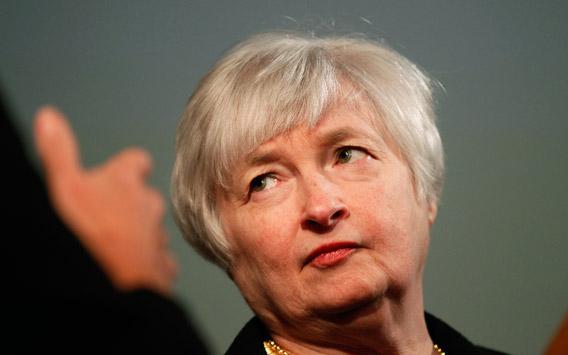Later today, President Obama will nominate Janet Yellen to be the head of the Federal Reserve. If all goes as planned, we will soon forget about the fact that she is a woman. Stories about the first female head of a major central bank will die down. Instead, much as happened with Madeleine Albright, Condoleezza Rice, and Hillary Clinton as Secretaries of State, we will start debating her policies, her interest rate decisions, her inflation targets, her easy money programs. We will move one step closer to not having to discuss or even think much about the fact that the person deciding our monetary policy wears lipstick sometimes.
But before that happens, let’s pause and consider the case of Janet Yellen’s rise, because it is a perfect example of how in this age of growing female power, gender matters both a lot and not at all.
In the early days of the search for a new Fed Chair, people in the Obama administration were exhibiting what you could call a lazy, reflexive sexism. In July, Ezra Klein reported on the condescending nature of its subtle whisper campaign against Yellen:
She lacks “toughness.” She’s short on “gravitas.” Too “soft-spoken” or “passive.” Some mused that she is not as aggressively brilliant or intellectually probing as other candidates—though they hasten to say she’s clearly very knowledgeable about monetary policy. Others have wondered whether she could handle the inevitable fights with Congress.
Federal Reserve Bank of Dallas President Richard Fisher admitted she was “extremely capable” but said the idea to appoint her was “driven by gender,” which is preposterous, given that she’s been the vice chairwoman of the Fed since 2010, and in any organization the number two person is a natural successor to number one. Obama’s people, meanwhile, seemed surprised at the backlash against the president’s first choice, Larry Summers; I guess they figured everyone had forgotten what he’d said about women and the math curve, not to mention his resume. The search for the Fed chair became another chapter in the five-year storyline about the Obama administration as a boys club, where dudes play basketball and call each other “dude” a lot, and sulk when the ladies complain.
There is nothing wrong with dissecting the personality of the Fed chair. In fact, it’s a time-honored tradition, as each of these titans has taken on his own mythology: Paul Volcker was aggressive, Alan Greenspan was quietly certain (and went to a lot of Washington parties), Ben Bernanke was low key. But the dissection should be based on something other than generic, unimaginative gender stereotypes. When it comes to toughness and passivity, for example, Janet Yellen’s record, probably like most people in positions of leadership, is complicated. She’s been tough in some circumstances and gentler in others. Combative sometimes and conciliatory at other times.
Yellen was one of the first public officials to warn about the dangers of the housing bubble. But when she was president of the San Francisco Fed, she failed to translate her concerns into any action that would have prevented the worst consequences of that bubble. Which is womanly: The action or the inaction? In a recent Wall Street Journal profile of Yellen, people who worked with her left with exactly opposite impressions. Jeffrey Lacker, president of the Federal Reserve Bank of Richmond, said, “She listens to all sides of a debate.” Dick Anderson, who was the chief operating officer of the Fed’s Washington board, said, “Yellen’s abrasive, intimidating style is probably more suited for a ‘Mad Men’ era as opposed to a modern office environment.” (Related: Dick Anderson does not understand Mad Men.) Judging purely by gender stereotypes, the flurry of profiles have left a mixed bag of impressions, calling her “combative,” “meticulously prepared,” “less averse to conflict” and a “consensus builder.” The New York Times profile of Yellen today begins with a mommy story about how she paid her babysitter well, but then explains how she translated that babysitter policy into a larger labor market theory still used by the Fed today.
There are deep divisions in the Fed and lots of hawks who oppose Yellen’s general outlook, which has been to push the Fed to take more aggressive measures to stimulate growth. There are politicians whose entire careers depend on an economic turnaround. There is, in other words, much dramatic potential in the future of monetary policy. And what kind of lasting reputation Yellen makes for herself in that drama remains to be seen. But whatever it is, may it at least transcend the poles—too tough or too nurturing—we have set up for our female leaders.
